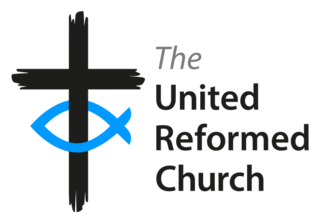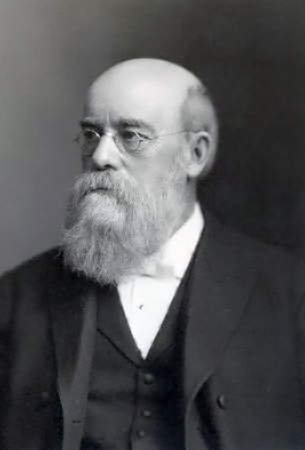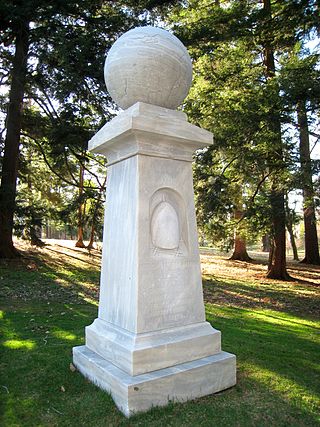Related Research Articles

The Christian Church (Disciples of Christ) is a mainline Protestant Christian denomination in the United States and Canada. The denomination started with the Restoration Movement during the Second Great Awakening, first existing during the 19th century as a loose association of churches working towards Christian unity, then slowly forming quasi-denominational structures through missionary societies, regional associations, and an international convention. In 1968, the Disciples of Christ officially adopted a denominational structure at which time a group of churches left to remain nondenominational.

The United Reformed Church (URC) is a Protestant Christian church in the United Kingdom. As of 2024 it had approximately 44,000 members in around 1,250 congregations with 334 stipendiary ministers.

Congregationalism is a Reformed (Calvinist) tradition of Protestant Christianity in which churches practice congregational government. Each congregation independently and autonomously runs its own affairs. These principles are enshrined in the Cambridge Platform (1648) and the Savoy Declaration (1658), Congregationalist confessions of faith. The Congregationalist Churches are a continuity of the theological tradition upheld by the Puritans. Their genesis was through the work of Congregationalist divines Robert Browne, Henry Barrowe, and John Greenwood.

The Uniting Church in Australia (UCA) was founded on 22 June 1977, when most congregations of the Methodist Church of Australasia, about two-thirds of the Presbyterian Church of Australia and almost all the churches of the Congregational Union of Australia united under the Basis of Union. According to the church, it had 243,000 members in 2018. In the 2016 census, 870,183 Australians identified with the church, but that figure fell to 673,260 in the 2021 census. In the 2011 census, that figure was 1,065,796.

The Church of the Nazarene is a Christian denomination that emerged in North America from the 19th-century Wesleyan-Holiness movement within Methodism. It is headquartered in Lenexa, Kansas. With its members commonly referred to as Nazarenes, it is the largest denomination in the world aligned with the Wesleyan-Holiness movement and is a member of the World Methodist Council.

The Restoration Movement is a Christian movement that began on the United States frontier during the Second Great Awakening (1790–1840) of the early 19th century. The pioneers of this movement were seeking to reform the church from within and sought "the unification of all Christians in a single body patterned after the church of the New Testament."

The United Church of Christ (UCC) is a socially liberal mainline Protestant Christian denomination based in the United States, with historical and confessional roots in the Congregational, Restorationist, Continental Reformed, and Lutheran traditions, and with approximately 4,600 churches and 712,000 members. The UCC is a historical continuation of the General Council of Congregational Christian churches founded under the influence of New England Puritanism. Moreover, it also subsumed the third largest Calvinist group in the country, the German Reformed. Notably, its modern members' theological and socio-political stances are often very different from those of its predecessors.

The Congregational Christian Churches was a Protestant Christian denomination that operated in the U.S. from 1931 through 1957. On the latter date, most of its churches joined the Evangelical and Reformed Church in a merger to become the United Church of Christ. Others created the National Association of Congregational Christian Churches or joined the Conservative Congregational Christian Conference that formed earlier in 1945. During the forementioned period, its churches were organized nationally into a General Council, with parallel state conferences, sectional associations, and missionary instrumentalities. Congregations, however, retained their local autonomy and these groups were legally separate from the congregations.

Washington Gladden was a leading American Congregational pastor and early leader in the Social Gospel movement. He was a leading member of the Progressive Movement, serving for two years as a member of the Columbus, Ohio city council and campaigning against Boss Tweed as religious editor of the New York Independent. Gladden was probably the first leading U.S. religious figure to support unionization of the workforce; he also opposed racial segregation. He was a prolific writer who wrote hundreds of poems, hymns, articles, editorials, and books.
The Christian Connection was a Christian movement in the United States of America that developed in several places during the late 18th and early 19th centuries, composed of members who withdrew from other Christian denominations. It was influenced by settling the frontier as well as the formation of the new United States and its separation from Great Britain. The Christian Connection professed no creed, instead relying strictly on the Bible.
The United Church in Jamaica and the Cayman Islands is a united church formed on 1 December 1965 as the "United Church of Jamaica and Grand Cayman" by bringing the Protestant denominations "Presbyterian Church in Jamaica" and "Congregational Union of Jamaica" together. The "Disciples of Christ in Jamaica" joined on 13 December 1992, at which time the current name was adopted.

The National Association of Congregational Christian Churches (NACCC) is an association of 304 churches providing fellowship for and services to churches from the Congregational tradition. The Association maintains its national office in Oak Creek, Wisconsin, a suburb of Milwaukee. The body was founded in 1955 by former clergy and laypeople of the Congregational Christian Churches in response to that denomination's pending merger with the Evangelical and Reformed Church to form the United Church of Christ in 1957.

The Young People's Christian Union (Y.P.C.U.), organized in 1889, was a Universalist youth group created to develop the spiritual life of young people and advance the work of the Universalist church. Soon after it was founded, the Y.P.C.U. focused its attention on missionary work. It was instrumental in the founding of new southern churches and the creation of a Post Office Mission for the distribution of religious literature.

The Conservative Congregational Christian Conference is a Congregationalist denomination of Protestant Christianity that is based in the United States. It is the most conservative and oldest Congregationalist denomination in America following the dissolution of the Congregational Christian Churches. It is a member of the World Evangelical Congregational Fellowship and the National Association of Evangelicals.
Signs of the Times is a monthly magazine originally published by Pacific Press, a Seventh-day Adventist publishing house. Signs presents articles that are considered to be helpful in assisting readers to live in modern society. The magazine focuses on life's-style issues, health articles and Christian devotional and other religious articles. From its historical roots, the magazine emphasizes the second coming of Christ to this earth and living such lives so as to be able to meet Jesus at His second coming.

The Haystack Prayer Meeting, held in Williamstown, Massachusetts, in August 1806, is viewed by many scholars as the seminal event for the development of American Protestant missions in the subsequent decades and century. Missions are still supported today by American churches.

Samuel Parkes Cadman was an English-born American liberal Protestant clergyman, newspaper writer, and pioneer Christian radio broadcaster of the 1920s and 1930s. He was an early advocate of ecumenism and an outspoken opponent of anti-Semitism and racial intolerance. By the time of his death in 1936, he was called "the foremost minister of Congregational faith" by the New York Times.

The United Church of Christ in the Philippines is a Christian denomination in the Philippines. Established in its present form in Malate, Manila, it resulted from the merger of the Evangelical Church of the Philippines, the Philippine Methodist Church, the Disciples of Christ, the United Evangelical Church and several independent congregations.
The Michigan Conference of the United Church of Christ (MCUCC) is the regional body of the United Church of Christ (UCC) within the U.S. state of Michigan. It maintains headquarters in East Lansing and serves 145 UCC congregations throughout the state.
James William Fifield Jr. was an American Congregational minister who led the First Congregational Church in Los Angeles and was co-founder and president of the conservative free-market organization Spiritual Mobilization.
References
- ↑ A centurial history of the Mendon association of Congregational Ministers. p154 Mortimer Blake - 1853 "He attended over one hundred and fifty ecclesiastical councils; and did a large part of the editing of the " Christian Magazine," during its four years' continuance; and was in all ministerial labors abundant."
- ↑ The encyclopedia of the Stone-Campbell movement p272 Douglas Allen Foster - 2004 "The Disciple was the fruit of a merger between the news and opinion journal The Christian and the mission magazine World Call in 1974. The magazine started out as a bi-weekly, then became a monthly early in its life.